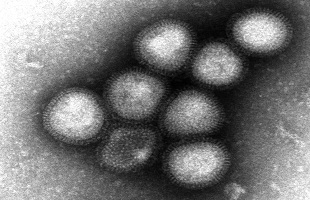Avian Influenza is a disease caused by type A flu virus (Avian Influenza). This flu virus comes from groups Orthomyxoviridae virus and common among birds. Previously, the virus is not found in animals or humans until it has be found in China in May 2013. The disease is highly emphasized and prioritized because patients who are suffering from this infection are very serious and critical .
Most patients with this infection have a history of exposure to birds poultry or contaminated environment, especially in markets where birds forage for sale. Currently, there is no strong evidence showing human-to-human transmission.
Picture : H7N9 Virus
Symptoms
The symptoms are not specific and it is similar to the common cold. Among the common symptoms are:
- fever
- cough
- difficulty in breathing
However, the disease caused by H7N9 virus would quickly evolve into severe and serious lung infections.
Complications
The complications of H7N9 infection include:
- Acute Respiratory Distress Syndrome (severe and life threatening breathing problem)
- Septic shock (blood pressure drops due to severe infection)
- Multiorgan failure (failure of vital organs)
The prognosis is worse for patients who are elderly and have chronic diseases such as diabetes mellitus and kidney disease.
The report found that patients diagnosed with H7N9 will be critically ill and an estimated 20 % of patients die from respiratory problems (Acute Respiratory Distress Syndrome) and failure of vital organs (multiorgan failure).
Treatment
Laboratory findings of a group of antiviral medications such as neuraminidase inhibitors Oseltamivir and Zanamivir are effective against the H7N9 virus.
Among patients infected with H7N9 in China, those who received early treatment with the antiviral drugs have less severe symptoms than those who delayed in getting treatment.
Prevention
Until now, no vaccine that can prevent a person from getting H7N9 infection .
However, there are some basic hygiene measures that can be applied to reduce the risk of infection such as:
- Hand hygiene
- Wash hands before, during and after preparing food; before eating; after going to the toilet; after handling animals and animal waste; when your hands are dirty; before and after care of a sick person at home.
- Wash hands with soap and running water when you found your hands are dirty; if hands are not visibly dirty, you can wash your hands with soap and water or an alcohol-based hand cleaner.
- Breathing hygiene
- When coughing or sneezing, one should cover mouth and nose with a mask, tissues, or folded elbows; throw the used tissue in the covered trash; wash your hands after touching the liquid from the respiratory tract.
- Food safety
- Do not eat the animal that are obviously sick or die from illness .
- The influenza virus becomes inactive when meat and eggs cooked at normal temperature for cooking (above 70 °C, where no visible pink meat).
Reference
- http://www.cdc.gov/flu/avianflu/h7n9-virus.htm
- http://www.who.int/influenza/human_animal_interface/influenza_h7n9/en/
- http://www.who.int/influenza/human_animal_interface/20140131_background_and_summary_H7N9_v1.pdf?ua=1
| Last Reviewed | : | 28 August 2020 |
| Writer/Translator | : | Dr. Mohamad Hamim b. Mohamad Hanifah |
| Accreditor | : | Dr. Zainal Abidin b. Mohamed@Ismail |
| Reviewer | : | Dr. Nor Faizah bt. Ghazali |








